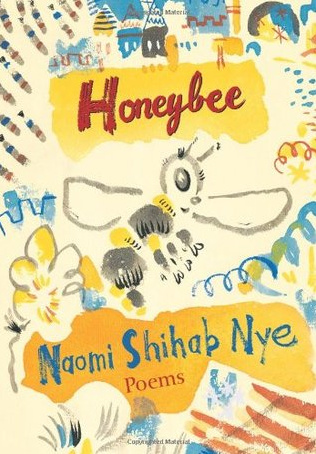

Naomi Shihab Nye · 176 pages
Rating: (396 votes)
“I am looking for the human who admits his flaws
Who shocks the adversary
By being kinder not stronger
What would that be like?
We don't even know”
― Naomi Shihab Nye, quote from Honeybee: Poems Short Prose
“I have slept so many times you might think I would really be awake by now”
― Naomi Shihab Nye, quote from Honeybee: Poems Short Prose
“Maybe we should just wander around other countries carrying books.”
― Naomi Shihab Nye, quote from Honeybee: Poems Short Prose
“I’m still the kid dreaming of the lives she’ll never have but guess what? Maybe she doesn’t want them.”
― Naomi Shihab Nye, quote from Honeybee: Poems Short Prose
“Only in words on a page can it still be yesterday.”
― Naomi Shihab Nye, quote from Honeybee: Poems Short Prose

“I was a fool, and I will always be a fool, and there will never, never, be a last day of school.”
― Naomi Shihab Nye, quote from Honeybee: Poems Short Prose
“So ask yourself, you swirling tornado of a human being, in a world of disoriented honeybees, do you want to look locked out the minute you sit down?”
― Naomi Shihab Nye, quote from Honeybee: Poems Short Prose
“He’s mourning his son, number 3000 American dead in Iraq, but as far as he can feel, the worst one.”
― Naomi Shihab Nye, quote from Honeybee: Poems Short Prose
“And didn’t we pledge, pledge, pledge, palms on our chests, every day we lived, pledge to the one nation, the freedom we believed in, didn’t we? Fat lot of good.”
― Naomi Shihab Nye, quote from Honeybee: Poems Short Prose
“It is difficult to predict what our finest moments will be, but we know when they happen.”
― Naomi Shihab Nye, quote from Honeybee: Poems Short Prose

“There are people we have never seen who are busy thinking up things we should be worried about.”
― Naomi Shihab Nye, quote from Honeybee: Poems Short Prose
“Hucky was so dazzled by the view of the colored lights from Forty-seventh Street, he could only manage to ask me two questions: (1) "doesn't it look like Christmas?" and (2) "Why is that man peeing on the street?" So I told him (1) "Yes," and (2) "Because that's the way they do it in New York. But you have to have a license first." I had to lie through my teeth about the last part because I'd already jumped ahead to what he was planning when we got out of the cab.”
― Steve Kluger, quote from My Most Excellent Year
“You're such a girl," she chided, but somehow the words came out too soft...too tender, and ended up sounding like a compliment.
Jay just laughed. "So what does that make you, the guy?" He squeezed her hand even tighter, keeping it buried in his.
"Or some sort of lesbian," she teased, raising one eyebrow. "Maybe we should try out a little girl-on-girl action."
"Nice, Violet. Do you kiss your mom with that mouth?" His eyes glinted as he watched her.
She leaned closer to him in the darkness of the car's interior. "No, but I'll kiss you with it.”
― Kimberly Derting, quote from Desires of the Dead
“People may hope that the meat they buy came from an animal who died without pain, but they do not really want to know about it. Yet those who, by their purchases, require animals to be killed do not deserve to be shielded from this or any other aspect of the production of the meat they buy.”
― Peter Singer, quote from Animal Liberation
“That’s how fossil hunting is: It takes over, like a hunger, and nothing else matters but what you find. And even when you find it, you still start looking again the next minute, because there might be something even better waiting.”
― Tracy Chevalier, quote from Remarkable Creatures
“Life is more fun if you play games.”
― Roald Dahl, quote from My Uncle Oswald
BookQuoters is a community of passionate readers who enjoy sharing the most meaningful, memorable and interesting quotes from great books. As the world communicates more and more via texts, memes and sound bytes, short but profound quotes from books have become more relevant and important. For some of us a quote becomes a mantra, a goal or a philosophy by which we live. For all of us, quotes are a great way to remember a book and to carry with us the author’s best ideas.
We thoughtfully gather quotes from our favorite books, both classic and current, and choose the ones that are most thought-provoking. Each quote represents a book that is interesting, well written and has potential to enhance the reader’s life. We also accept submissions from our visitors and will select the quotes we feel are most appealing to the BookQuoters community.
Founded in 2023, BookQuoters has quickly become a large and vibrant community of people who share an affinity for books. Books are seen by some as a throwback to a previous world; conversely, gleaning the main ideas of a book via a quote or a quick summary is typical of the Information Age but is a habit disdained by some diehard readers. We feel that we have the best of both worlds at BookQuoters; we read books cover-to-cover but offer you some of the highlights. We hope you’ll join us.